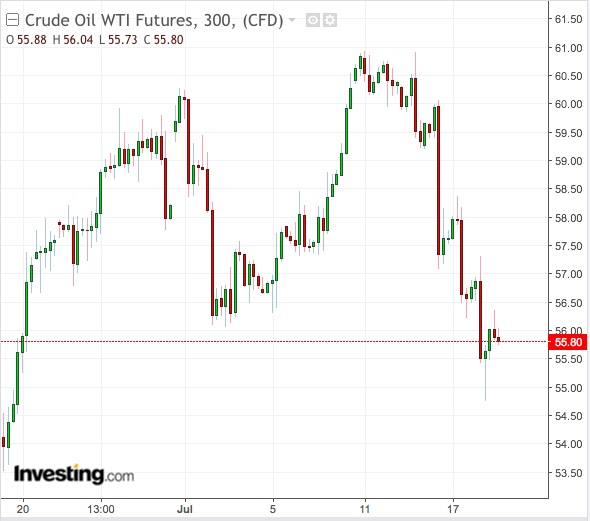Both have destroyed each other’s drones and seem ready for more conflict, even as they say they want talks. While few may want to give the U.S.-Iran style of gunboat diplomacy a chance, oil bulls should never be too complacent that there will be no breakthrough here—because in the off-chance there is one, another crude price collapse is very likely.
In his Thursday news conference at the Iranian mission to the United Nations, Iran's Foreign Minister Mohammad Javad Zarif again suggested that U.S. President Donald Trump’s sanctions on Tehran’s oil and leaders be removed—via Congress to make it harder for them to be reimposed—and the two sides could talk.
The New York Times, musing on Zarif’s call, said it will almost certainly be rejected by the Trump administration. For there to be talks, there should be no preconditions, says Washington, which views Iran as increasingly desperate to free itself of the sanctions.
Zarif was coy on whether he will meet Senator Rand Paul of Kentucky, Trump’s self-appointed envoy for getting negotiations going on resolving the nuclear-sanctions crisis between the two states. All the Iranian foreign minister would say is that he’s “seeing people from Congress”.
Zarif also dismissed the notion that should the talks happen, they would turn out to be a world spectacle like the U.S.-North Korea summit, but featuring Iranian President Hassan Rouhani and Trump this time. The foreign minister added that there was no need for a “photo-op” or “two-page document with a big signature”.
But beneath the grandstanding and continued offensives—a U.S. battle ship in the Strait of Hormuz destroyed an Iranian surveillance drone on Thursday, citing the familiar “defensive reasons” used by Tehran last month—there appears genuine desire on both sides to bring the more than year-long standoff to a close.
And that’s enough of a reason for oil bulls to be afraid. To be very afraid, actually.
Phil Flynn, senior market analyst for energy at the Price Futures Group brokerage in Chicago, devoted much of his Thursday morning column to the specter of what Iran’s oil could do to the market if it returned.
The avowed oil bull wrote:
“Oil traders know that this can be a game changer. The potential lifting of sanctions on Iranian oil could tip the balance of the market from being undersupplied to being oversupplied.”
“We know from past experience that when there are expectations of Iranian oil coming back to the market, it is very bearish.”
U.S. Could Meet Iran’s Demands Halfway
It’s unlikely that Trump would agree to set aside all the sanctions he’s built against Iran’s oil and leaders in order to bring Tehran to the negotiating table.
But it’s possible that he could meet Iran’s demands half-way by suspending his most objectionable economic actions and moves against the Islamic Republic for a specified period—say three months—to give the peace process a chance.

Investing.com’s projections are that the flat price of U.S. West Texas Intermediate crude and London’s Brent oil will fall about $5 a barrel within a week or two of the announcement that the two sides are ready to talk. And every rebound thereafter will be checked by the possibility of an impending Iran Nuclear Accord 2.0.
Trump Has A Lot To Gain From Deal, Despite Its Difficulties
We reiterate that agreeing to talks with Iran makes total sense for Trump, who needs crude prices to fall in order to make the U.S. pump price of gasoline cheaper before his re-election bid in November 2020.
The president has said in the past that he wants OPEC to pump an additional 2 million barrels per day of oil to lower energy costs for U.S. consumers. Yet, the Organization of the Petroleum Exporting Countries has gone the other way, tightening supply by 1.2 million barrels per day since December 2018, and wants to do the same now through March 2020.
Logic compels Trump to agree to a sit-down with the Iranians because that additional 2 million bpd he's seeking from OPEC is right there with Tehran. After the signing of its original 2015 nuclear accord with the Obama administration and other world powers, Tehran produced up to 2.5 million bpd at its peak.
Talks with Iran would instantly achieve two of Trump's immediate objectives: lower oil prices and a chance to reset yet another Obama-era "mistake".
Eventually, the president can gloat on how the "Trump Iran deal" is the better one for the world, versus Obama's original 2015 accord, which he had labeled as the "worst deal ever".
We don’t think we’ve heard the last on this yet.
